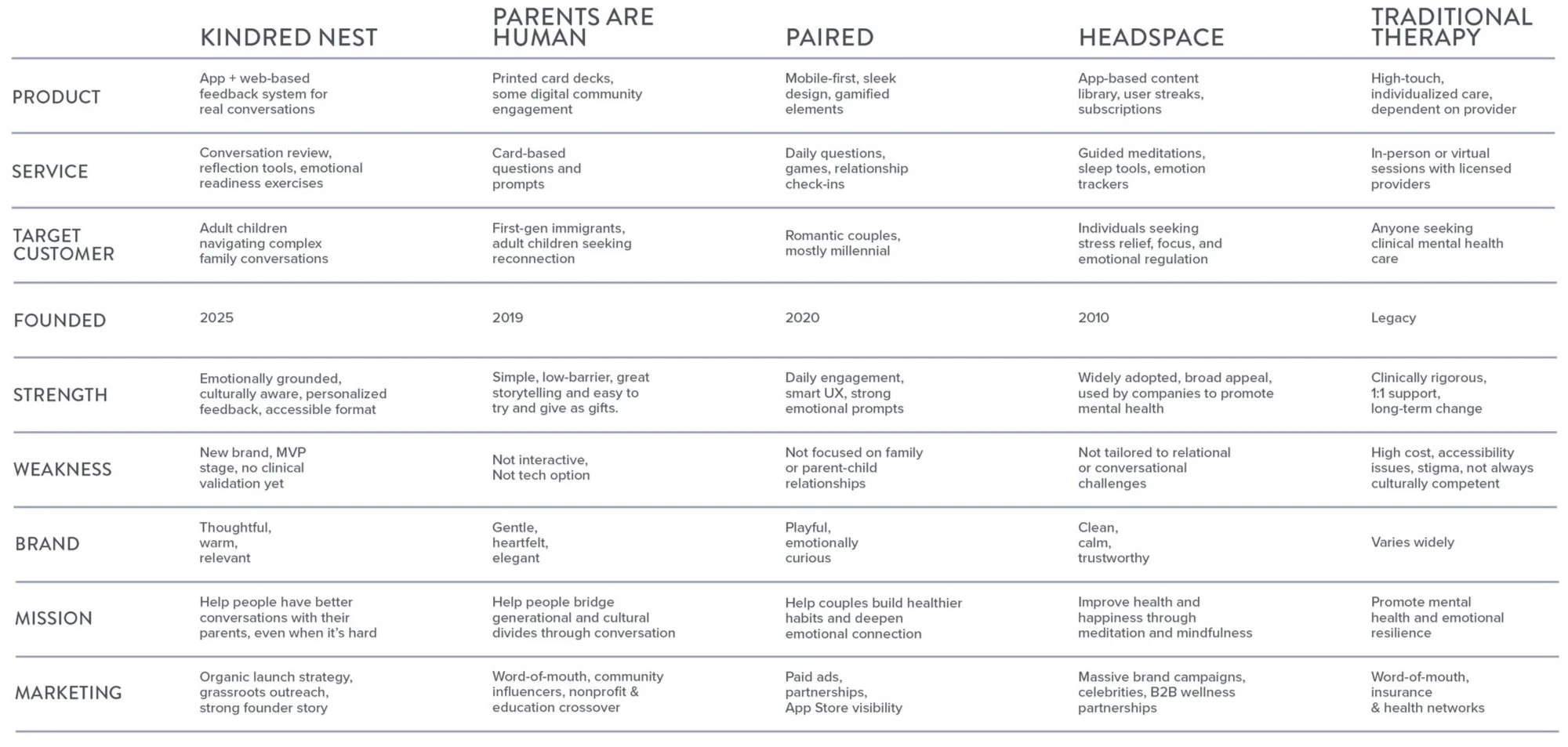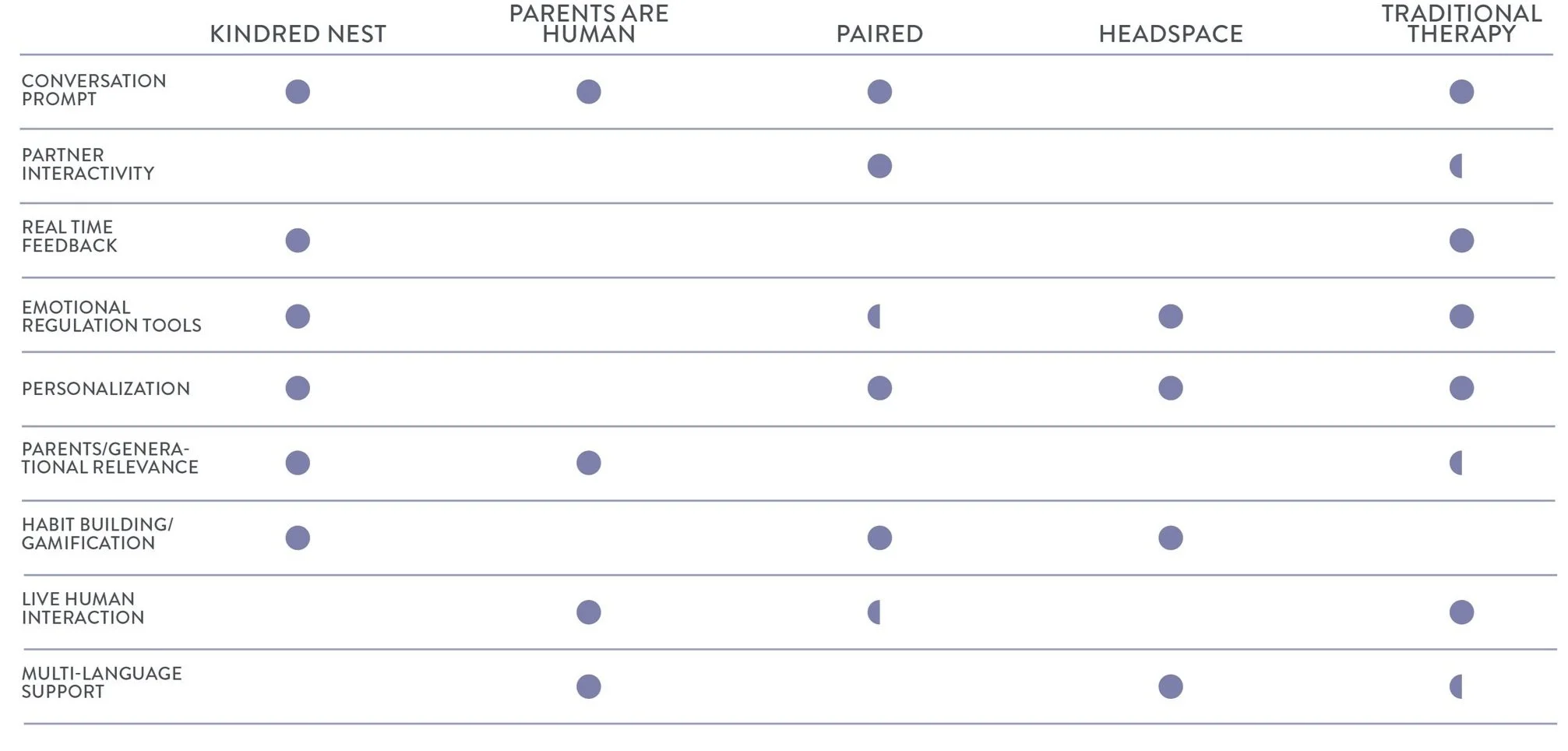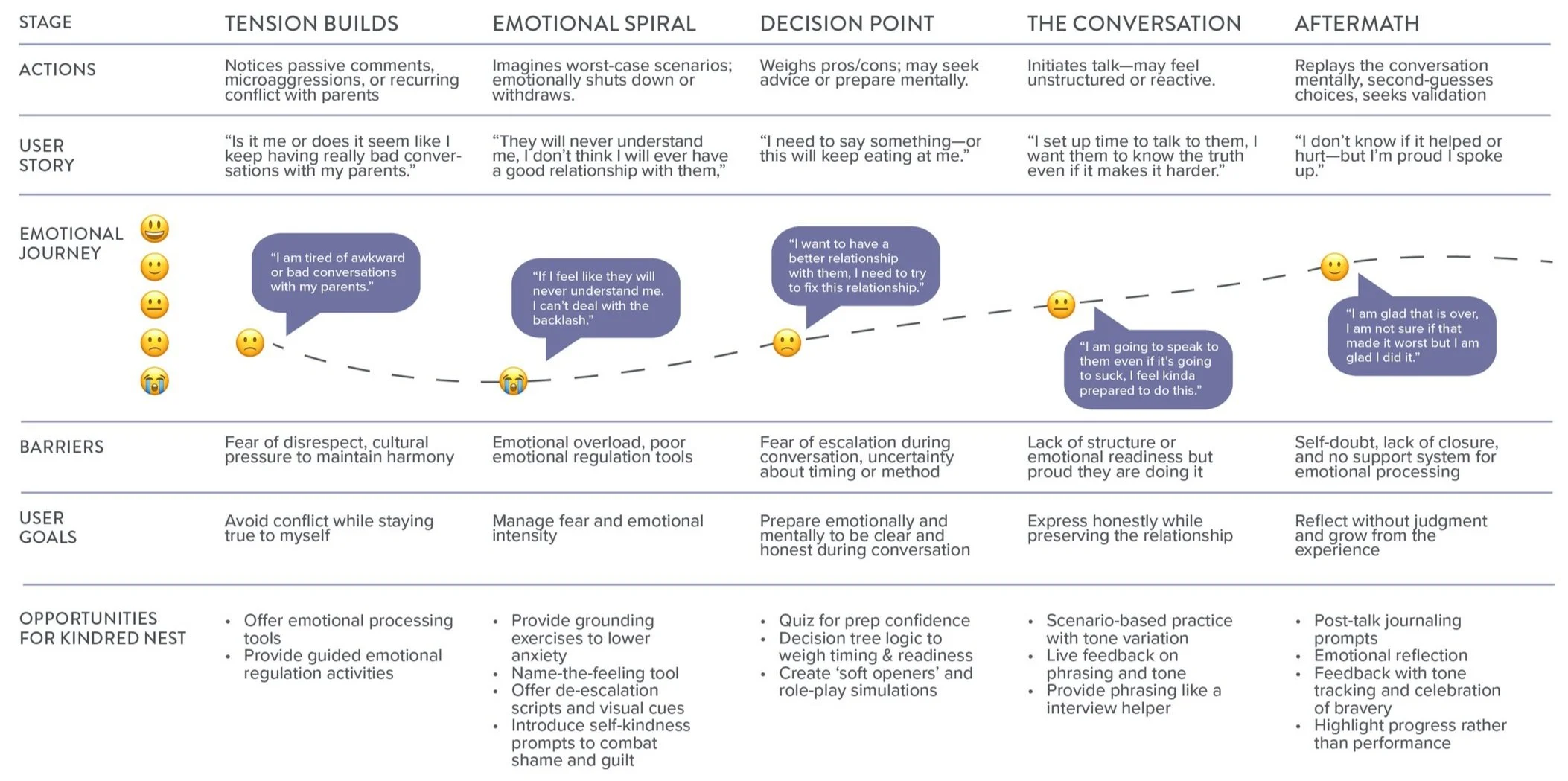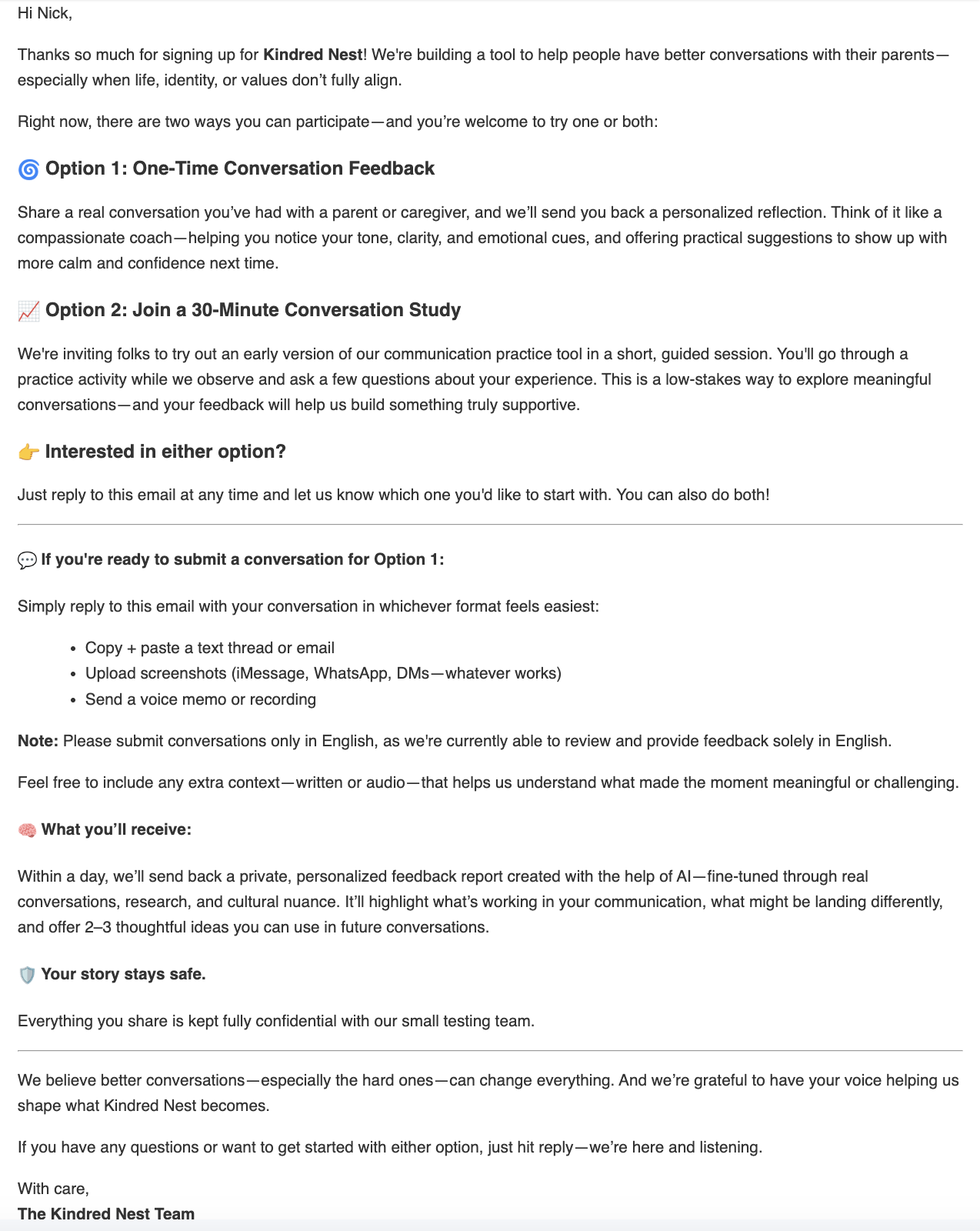
Objective
Adult children—especially those from immigrant families—often face emotional barriers when navigating complex conversations with their parents around relationships, boundaries, identity, expectations, and values.
Kindred Nest is a digital tool designed to help users prepare for and reflect on high-stakes conversations through culturally aware, emotionally intelligent interventions. Our goal: build emotional resilience and communication skills that last beyond a single conversation.
Existing tools focus on couples or clinical therapy. Few are designed for users navigating intergenerational, culturally layered conversations.
Our challenge: How might we help adult children build emotional readiness for sensitive conversations with their parents, without triggering shame, guilt, or cultural distance?
CLIENT
Kindred Nest
TOOLS
Miro, Figma, Bolt.ai, Loveable, Carrd, Tally Forms
MY ROLE
Product Strategist & UX Designer
I co-led product strategy and UX design, turning research into user journeys, emotional pain points, and a prioritized MVP. We built mid-fidelity prototypes in Figma, tested with 15+ users, and partnered with therapists to annotate conversations. Using Bolt.ai, we trained a culturally aware tone model to deliver personalized, resilience-focused feedback.

Audience research & Insights
Target Audiences:
Adults aged 30–45, especially first- and second-generation children of immigrants navigating identity, relationships, or expectations.
Market ResearcH
Landscape Review
Feature Comparisons
SWOT analysis
Key Insights
Pre-conversation emotional preparation is more effective than in-the-moment support.
Users want tools without feeling like it was a quiz or an assignment to improve their communication skills.
No single tool could solve the problem—but users valued practices that built emotional preparedness and resilience.

Product Strategy
Jobs To Be Done
“Help me talk to my parents about my life choices—without triggering guilt or distance.”
“Give me emotional tools to prepare and not freeze in the moment.”
“Show me I’m not just failing at these conversations with the most important relationship I have.”
MVP Features
Guided Visualizations – Short, sensory exercises to rehearse emotional state and framing.
Practice Conversation Scenarios – Interactive role-play to explore possible reactions and tone.
AI Feedback Analyser – Personalized conversation analysis with culturally attuned insights.
Reflections – Strength-based prompts to support learning and progress.
Learning Machine Model
Trained the model to detect emotional tone shifts (e.g., guilt, tension, empathy) and layered in contextual filters for cultural nuance, such as indirect communication styles and family obligation.
Modeled healthy communication techniques like nonviolent conversation, with feedback reviewed by therapists and seeded using anonymized user conversations annotated for tone, intent/impact gaps, and repair attempts.
Designed to deliver personalized, strengths-based feedback that adapts to cultural background—prioritizing confidence-building over critique and supporting emotional preparedness and post-conversation reflection.

Design Process
Ideation & Concepting
We translated emotional needs into tangible tools. Using Miro for journey mapping and a sticky note wall for feature clustering, we framed the user’s emotional arc: hesitation → preparation → resiliences
Prototyping & Iteration
We built a visualization prototype and pathway quiz in bolt.ai. Low-fidelity wireframes used warm tones, familiar rituals (e.g., chai, family rooms), and low cognitive load. We also did a wizard of oz experience of our feedback analyzer to confirm the level of feedback and personalization desired.
Early Prototype of Visualization Feature
Early Prototype of Pathway Quiz Feature
Testing & Feedback
We went out and tested our solution with 15 users; they shared observations and feedback on the pathway quiz feature, and we took these insights and refined our solution.
92% said they felt relatable, and the conversations felt relevant to their current experience.
80% said the scenarios helped them feel emotionally prepared.
Feedback prompted greater cultural customization and a desire for customization in response.
Wizard of Oz Email for Conversation Analysis

Solution
Prepare: Guided Visualization
Build micro-habits to emotionally prepare for tough conversations.
Rehearsed how users wanted to feel, not just what to say.
Grounded in sensory prompts: smell of chai, sound of home, warmth of setting.
Helped reframe anxiety into calm anticipation through visualization practices.
Practice: Roleplaying Scenarios
Simulate scenarios with feedback to boost confidence and refine responses.
Provide prompts for the user to simulate tough conversations with parents. AI will provide strengths, areas of improvement, and microhabits to practice based on the user’s submissions.
Option for personalization in the choice of scenarios, as well as the ability to add a custom response from their own experience.
Help users to grow in skills while encouraging strength-based communication skills.
Progress: Post-Conversation Analysis
Track growth and progress over time through real-life conversations.
Users can submit conversations with their parents through copying and pasting text or sharing an audio recording, which will be analyzed by the AI.
A personalized AI report with suggestions and encouragement based on the user’s tone, phrasing, and approach will be analyzed.
Users will be provided with areas of strength, areas of growth, and suggestions for future talks while also brief prompts encouraging processing and strength-based review.

Outcomes & Impact
80% of testers
preferred guided visualization
over journaling or real-time interventions.
higher confidence & emotional preparedness
reported by users before engaging with parents.
Strong product-market fit
signals from Gen Z and millennial children of immigrants.

Why it MATTERS
Kindred Nest isn’t just a product—it’s a shift in posture toward hard conversations. For many, family dialogue has long been shaped by duty, silence, or shame. This tool helps build courage, clarity, and calm, honoring identity, nuance, and healing.
Redesigned ParkATX to prioritize equity, accessibility, and community-driven solutions.












